|
|
|
Sort Order |
|
|
|
Items / Page
|
|
|
|
|
|
|
| Srl | Item |
| 1 |
ID:
110657


|
|
|
|
|
| Publication |
2011.
|
| Summary/Abstract |
Previous analysis finds that people respond differently to "financial" (e.g., tax evasion) and "moral" (e.g., sexual misconduct) political scandals. However, experimental and observational studies tend to reach different conclusions about which type of scandal induces a stronger negative reaction from the public. We use an experiment embedded in a national survey to examine the possibility that these divergent findings can, in part, be explained by a failure to consider the effects of abuses of power. Consistent with previous experimental work, we find that people respond more negatively to financial scandals than to moral scandals when they do not involve abuses of power. However, abuses of power substantially affect responses to both types of scandals. We also find that moral and financial scandals affect personal and job evaluations of a politician differently. These findings support our contention that to understand public responses to scandal, it is crucial to consider the relationship between the scandalous behavior and the official's formal responsibilities.
|
|
|
|
|
|
|
|
|
|
|
|
|
|
|
|
| 2 |
ID:
110652


|
|
|
|
|
| Publication |
2011.
|
| Summary/Abstract |
As we write, the world is still in the grips of a financial crisis. Germany was one of the first countries to bail out a bank in July 2007. Then, in September 2007, the United Kingdom (UK) witnessed a run on a building society, Northern Rock, and the subsequent widespread nationalization of its banking sector. In the United States, the crisis led to a number of collapses among financial institutions, most famously Bear Stearns and Lehman Brothers, and the bail out of the insurance group, AIG, all in 2008.
|
|
|
|
|
|
|
|
|
|
|
|
|
|
|
|
| 3 |
ID:
110649


|
|
|
|
|
| Publication |
2011.
|
| Summary/Abstract |
Most Americans lack any substantial degree of ideological sophistication (Kinder 1998), yet they often manage to express coherent views across a range of issues. The conventional explanation for this is that people rely on judgmental shortcuts (e.g., Sniderman, Brody, and Tetlock 1991). These "heuristics" permit individuals with sufficient political sophistication to sort and filter incoming messages to form relatively consistent views that align with preexisting values (Zaller 1992).
|
|
|
|
|
|
|
|
|
|
|
|
|
|
|
|
| 4 |
ID:
110654
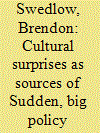

|
|
|
|
|
| Publication |
2011.
|
| Summary/Abstract |
A major complaint against cultural theories is that they cannot explain political change (Lockhart 1997). Cultural and institutional accounts of politics are also often seen as antagonistic (Chai 1997; Grendstad and Selle 1995; Lockhart 1999). The cultural theory (CT) developed by Mary Douglas, Aaron Wildavsky, and others (see, e.g., Schwarz and Thompson 1990; Thompson, Ellis, and Wildavsky 1990), by contrast, offers a theory of culture that includes a theory of cultural change that integrates institutions into its explanation of change (Lockhart 1997, 1999; Thompson, Ellis, and Wildavsky 1990, 69-81; Wildavsky 1985). Moreover, CT can help specify the cultural conditions for sudden, big institutional and policy change, thereby, I argue, strengthening Frank Baumgartner and Bryan Jones's "punctuated equilibria" (PE) theory of change (Baumgartner and Jones 1993, 2002). The plausibility of this CT of PE change is illustrated in this article by using it to explain dramatic changes in forest and wildlife management in the Pacific Northwest (PNW) (building on Swedlow 2002a, b, 2003, 2007, 2009, and 2011a, b).
|
|
|
|
|
|
|
|
|
|
|
|
|
|
|
|
| 5 |
ID:
110666
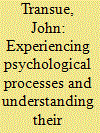

|
|
|
|
|
| Publication |
2011.
|
| Summary/Abstract |
This article presents three classroom demonstrations designed to help instructors who would like to include some political psychology in their classes. All three demonstrations involve student participation and give the students direct experience with psychological processes relevant to political science. Specifically, I describe how I present the Stroop task, a priming task, and Tversky and Kahneman's Asian disease experiment in my own teaching. For each of the demonstrations, I give practical advice for classroom use, a short description of the psychological processes the demonstration illustrates, and a brief discussion of how those processes have been applied in political science.
|
|
|
|
|
|
|
|
|
|
|
|
|
|
|
|
| 6 |
ID:
110664
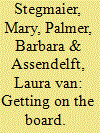

|
|
|
|
|
| Publication |
2011.
|
| Summary/Abstract |
Although the overall representation of women in the field of political science has increased gradually over the last several decades, most gains are being achieved at junior levels. When considering the status of women in the profession, it is instructive to incorporate information on the presence of women in editorial positions at top-ranked political science journals. Our 2010 snapshot of women editors in the top 50 journals in the field finds that on average, women are reasonably well represented in editorial positions in proportion to the ranks they hold in the profession overall and at PhD-granting institutions; however, substantial variation exists across journals. Our discussion of the role-model effect and the gatekeeping power of editors suggests that greater inclusion of women and others who bring different perspectives to research could result in a more vibrant range of research topics and methodological approaches published in a journal.
|
|
|
|
|
|
|
|
|
|
|
|
|
|
|
|
| 7 |
ID:
110650
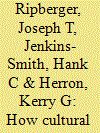

|
|
|
|
|
| Publication |
2011.
|
| Summary/Abstract |
Scholars have used cultural theory (CT) to explain risk perceptions and opinion formation across an impressive array of public issues, ranging from environmental, regulatory, and energy policy to public health and economics. Although disparate, all these issues concern domestic policies. This article breaks with this trend by exploring the extent to which CT can help scholars better understand public beliefs about national security. Of critical importance in debates about national security are perceptions of individual versus collective threat and the appropriate role of authoritative institutions in protecting society from these threats. Because CT provides a framework that explicitly addresses these dimensions, national security issues provide an illuminating canvas for evaluating the theory's explanatory utility.
|
|
|
|
|
|
|
|
|
|
|
|
|
|
|
|
| 8 |
ID:
110656
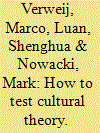

|
|
|
|
|
| Publication |
2011.
|
| Summary/Abstract |
This symposium highlighted the relevance of the cultural theory (CT) pioneered by anthropologists Mary Douglas, Steve Rayner, and Michael Thompson and political scientists Aaron Wildavsky and Richard Ellis for explaining political phenomena. In this concluding article, we suggest ways in which CT can be further tested and developed. First, we describe how the theory has been applied thus far and some of the achievements of these applications. Then, we examine some of the challenges revealed by this research. Finally, we discuss ways of applying CT that promise to help meet these challenges. These methods include nesting case studies and combining case study and survey research, simulations, experiments, and approaches from social neuroscience.
|
|
|
|
|
|
|
|
|
|
|
|
|
|
|
|
| 9 |
ID:
110651
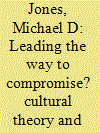

|
|
|
|
|
| Publication |
2011.
|
| Summary/Abstract |
Climate change is easily one of the most contentious policy problems facing the United States. A majority of climate scientists agree that the earth has warmed over the last 100 years and that human-made greenhouse gasses are the cause (e.g., Doran and Zimmerman 2009; IPCC 2007; Oreskes 2004, but also see Bray 2010), yet a nontrivial portion of the US population diverges sharply from this dominant scientific position (see, for example, Jenkins-Smith, Herron, and Silva 2010, 41-45; Leiserowitz 2006; Nisbet and Myers 2007). Why? Past research usually points to the public's lack of climate change knowledge (e.g., Kellstedt, Zahran, and Vedlitz 2008), finds that media over report the views of climate change skeptics in a misplaced quest for "balanced" reporting (e.g., Boykoff and Boykoff 2007, but see Swedlow and Wildavsky 1995), or the public simply take cues from opinion leaders whom they trust (e.g., Malka, Krosnick, and Langer 2009). This article moves beyond the predominant concern with climate change knowledge, messaging structures, and cue taking in past research, and shifts the focus to characteristics intrinsic to the individual. The research presented here assesses the extent that the cultural theory (CT) developed by Mary Douglas, Aaron Wildavsky, and others (see, e.g., Schwarz and Thompson 1990; Thompson, Ellis, and Wildavsky 1990) can help political scientists understand why so many Americans do not align themselves with the majority of scientists and can help policy makers broker compromises on climate change policy.
|
|
|
|
|
|
|
|
|
|
|
|
|
|
|
|
| 10 |
ID:
110658
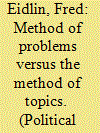

|
|
|
|
|
| Publication |
2011.
|
| Summary/Abstract |
Confused students researching papers not knowing where they are going. Articles, lectures, and books on exciting topics that turn out to be boring. Such familiar phenomena are symptoms of a widespread, largely unconscious methodological habit of focusing on topics rather than problems. This habit rests on views about knowledge that are deeply ingrained in commonsense knowledge and in the methodology of mainstream social science. Such views saturate the understanding of scientific inquiry assumed by most methods textbooks. This article criticizes the method of topics and contrasts it with the method of problems. The word "topic" suggests that there is some surface to cover, but not why covering it might be interesting. Interesting research is problem-driven. It begins with a sense that something is amiss with existing knowledge and requires explanation. Problem-driven research begins, not with collection of data or facts, or with clarification of concepts, but with identification of inconsistencies or gaps in existing knowledge. It seeks to solve problems through free invention and severe criticism of hypotheses.
|
|
|
|
|
|
|
|
|
|
|
|
|
|
|
|
| 11 |
ID:
110662


|
|
|
|
|
| Publication |
2011.
|
| Summary/Abstract |
Existing measures of article and journal impact count citations that articles receive in other articles. Such metrics ignore citations that articles receive in monographs and edited-volume chapters. Counting article citations in books reveals that popular measures of article and journal impact discriminate against articles and journals that receive citations in books rather than (or in addition to) citations in other articles, thereby discriminating against the research contributions of scholars who publish such articles. Analysis of citation patterns over 25 years reveals that citations in books have declined in American politics research while citations in articles have increased; citations in both books and articles remain important in the other subfields. Findings suggest that political scientists should supplement indicators of journal impact based on citations in peer-reviewed articles with measures that account for the citations that published articles receive in books.
|
|
|
|
|
|
|
|
|
|
|
|
|
|
|
|
| 12 |
ID:
110665
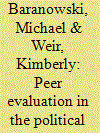

|
|
|
|
|
| Publication |
2011.
|
| Summary/Abstract |
When student presentations are offered in the classroom, instructors are most likely to be concerned about the extent to which students pay attention and learn from the experience of not only giving a presentation, but about what students learn as an audience. After devising a peer-evaluation instrument for students to evaluate their classmates' presentations, over the course of two years and 10 courses, we surveyed students to determine the effectiveness and usefulness of peer evaluations. We found that students are more likely to pay attention, gain a different perspective on the presentation experience, and be more engaged in the presentation when they evaluate one another.
|
|
|
|
|
|
|
|
|
|
|
|
|
|
|
|
| 13 |
ID:
110667
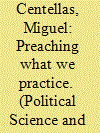

|
|
|
|
|
| Publication |
2011.
|
| Summary/Abstract |
Recent discussions of teaching research methods have focused on understanding the relationship between methods courses and the broader discipline, including the need to integrate qualitative methods and other approaches beyond the traditional statistical approaches still common in the majority of undergraduate research methods courses. This article contributes to this conversation by arguing that the basic elements of research design and qualitative techniques should be integrated into substantive (or "non-methods") courses across the discipline. To accomplish this aim, I offer a brief outline of methodological benchmark skills-drawn from the pool of skills necessary for a successful thesis-that can be taught in various courses across the discipline through a traditional assignment: the semester research paper.
|
|
|
|
|
|
|
|
|
|
|
|
|
|
|
|
| 14 |
ID:
110661


|
|
|
|
|
| Publication |
2011.
|
| Summary/Abstract |
The ubiquity of data in the twenty-first century provides unprecedented opportunities for social science research, but it also creates troubling possibilities for privacy violations. The emerging field of statistical disclosure control (SDC) studies how data collectors and analysts can find an optimal solution to balancing privacy protection and data utility. This article introduces SDC to readers in the applied political science research community and outlines its implications for analyzing individual-level data. The vocabulary of SDC is introduced and is followed with a discussion emphasizing just how easy it is to break almost any release of supposedly "anonymized" data. The article then describes how SDC measures almost always destroy the ability of researchers to accurately analyze complex survey data. These results are in conflict with increasing trends toward greater transparency in the social sciences. A discussion of the future of SDC concludes the article.
|
|
|
|
|
|
|
|
|
|
|
|
|
|
|
|
| 15 |
ID:
110660


|
|
|
|
|
| Publication |
2011.
|
| Summary/Abstract |
This article examines how the American civil response to September 11 profoundly transformed the core of American Muslim political identity for a generation. I outline the evolving contours of the American Muslim as citizens after September 11 through an analysis of the impact of race and religion on two relationships: state to citizen and citizen to citizen. The American political response to September 11 had both positive and negative impacts for domiciled Muslims. At the national level, this event has forced American Muslims into a period of institution building and active citizenship while the federal government's response has problematized the Muslim as a continuous potential security threat. One simmering question for the American citizenry in general concerns the loyalty of the American Muslim. In the future, the American Muslim political class will be engaged in a continued effort to write Muslims into the American narrative in the same way that previous immigrant groups have fought to reappropriate "Americanness." The larger philosophical question in this process is how, in doing so, this group can prove its loyalty to the nation while maintaining a distinctive religious culture and heritage. What will be the future core of the maturing American Muslim as both a citizen of the republic and a servant of his or her god?
|
|
|
|
|
|
|
|
|
|
|
|
|
|
|
|
| 16 |
ID:
110663


|
|
|
|
|
| Publication |
2011.
|
| Summary/Abstract |
Publication in scholarly journals is a key to scholarly success. However, previous studies have shown that across many disciplines, including political science, women publish significantly less than men and prefer to use qualitative methodology. In this article, we explore the accuracy of these trends by examining a decade's worth (2000-09) of women's publications in four top political science journals (the American Political Science Review, the American Journal of Political Science, the Journal of Politics, and PS: Political Science and Politics). Using a systematic content analysis, we determine the gender ratio of the authors, funding sources, methods, and the ratio of qualitative and quantitative studies. We find that while women publish less than men in each of these venues, their publication rates resemble their representation in the field.
|
|
|
|
|
|
|
|
|
|
|
|
|
|
|
|
| 17 |
ID:
110655


|
|
|
|
|
| Publication |
2011.
|
| Summary/Abstract |
Burgeoning literature within the social sciences studies the effects of culture on collective action. In economics, this topic can be found in the rising fields of behavioral economics (Camerer, Loewenstein, and Rabin 2004; Diamond, Vartiainen, and Jahnssonin 2007; Thaler 2007; Wilkinson 2007) and experimental economics (Friedman and Sunder 1994; Friedman 2004; Kagel and Roth 1995), where increasing notice is taken of individuals who do not behave uniformly as self-interested, rational utility maximizers. Instead, altruism (Andreoni and Miller 2008), reciprocity (Fehr and Gachter 2000; Fischbacher and Gachter 2010; Rabin 1993), social welfare maximization (Charness and Rabin 2002), and inequality aversion (Bolton and Ockenfels 2000; Fehr and Schmidt 1999) have been proposed as explanations for behavior in collective action situations.
|
|
|
|
|
|
|
|
|
|
|
|
|
|
|
|
| 18 |
ID:
110653


|
|
|
|
|
| Publication |
2011.
|
| Summary/Abstract |
In his influential study of persistently democratic societies Lijphart (1999) argues for the general superiority of "consensus" over "majoritarian" institutions. Consensus institutions disperse power among distinct elements of a broad majority, while majoritarian institutions concentrate power in centralized institutions based on bare electoral majorities or pluralities. Lijphart finds that consensus institutions achieve levels of macroeconomic management and violence control similar to those of their majoritarian counterparts and perform considerably better representing various segments of society. In reflecting on his study, Lijphart offers the thought that highly effective consensus institutions would likely interact symbiotically with a "consensual political culture" (1999, 306). That is, Lijphart proposes that a consensual political culture, coupled with consensus institutions, would produce better government performance than consensus institutions. Yet he leaves the nature of such a culture unclear.
|
|
|
|
|
|
|
|
|
|
|
|
|
|
|
|
| 19 |
ID:
110668
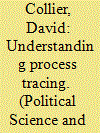

|
|
|
|
|
| Publication |
2011.
|
| Summary/Abstract |
Process tracing is a fundamental tool of qualitative analysis. This method is often invoked by scholars who carry out within-case analysis based on qualitative data, yet frequently it is neither adequately understood nor rigorously applied. This deficit motivates this article, which offers a new framework for carrying out process tracing. The reformulation integrates discussions of process tracing and causal-process observations, gives greater attention to description as a key contribution, and emphasizes the causal sequence in which process-tracing observations can be situated. In the current period of major innovation in quantitative tools for causal inference, this reformulation is part of a wider, parallel effort to achieve greater systematization of qualitative methods. A key point here is that these methods can add inferential leverage that is often lacking in quantitative analysis. This article is accompanied by online teaching exercises, focused on four examples from American politics, two from comparative politics, three from international relations, and one from public health/epidemiology.
|
|
|
|
|
|
|
|
|
|
|
|
|
|
|
|
| 20 |
ID:
110659


|
|
|
|
|
| Publication |
2011.
|
| Summary/Abstract |
The number of radio stations airing political talk shows-predominantly conservative talk radio-has surged in the past few years. This massive change in the radio industry says something about the demand for such shows, but attributing the rise of talk radio to a corresponding rise in conservative popular opinion is misleading. We argue that this remarkable growth is better explained by the collision of two changes that have transformed the radio business: deregulation and the mainstreaming of digital music technologies. Regulatory changes have shifted much of radio production and control from local to mass production (managed by industry giants such as Clear Channel Communications) and created a context ripe for nationally syndicated hosts such as Rush Limbaugh, Glenn Beck, and Mark Levin. Meanwhile, rapid technological changes have given consumers more control over the way they listen to music. Technologies such as MP3 players, Internet radio, smart phones, and Pandora Radio have made it more difficult for stations with a music format to be profitable. As music programming has become more problematic, many stations have developed a highly successful business model by converting to talk formats airing nationally syndicated shows.
|
|
|
|
|
|
|
|
|
|
|
|
|
|
|
|
|
|
|
|
|